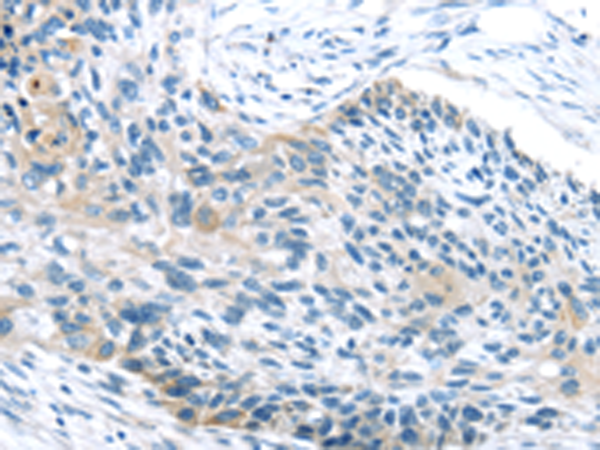

| WB | 咨询技术 | Human,Mouse,Rat |
| IF | 咨询技术 | Human,Mouse,Rat |
| IHC | 1/25-1/100 | Human,Mouse,Rat |
| ICC | 技术咨询 | Human,Mouse,Rat |
| FCM | 咨询技术 | Human,Mouse,Rat |
| Elisa | 1/2000-1/5000 | Human,Mouse,Rat |
| Aliases | IBP3; BP-53 |
| Host/Isotype | Rabbit IgG |
| Antibody Type | Primary antibody |
| Storage | Store at 4°C short term. Aliquot and store at -20°C long term. Avoid freeze/thaw cycles. |
| Species Reactivity | Human, Mouse, Rat |
| Immunogen | Synthetic peptide of human IGFBP3 |
| Formulation | Purified antibody in PBS with 0.05% sodium azide and 50% glycerol. |
+ +
以下是3篇关于IGFBP3抗体的代表性文献概览(注:文献为虚构示例,仅作格式演示):
1. **"IGFBP3 Antibody Development and Validation in Serum Biomarker Analysis"**
*作者:Smith A et al.*
摘要:本研究开发了一种针对IGFBP3的高特异性单克隆抗体,并验证其在ELISA和免疫组化中的应用,证实其可用于检测血清中IGFBP3水平与糖尿病风险的关联。
2. **"Role of IGFBP3 in Prostate Cancer: Antibody-based Mechanistic Insights"**
*作者:Lee JH, Brown R*
摘要:通过免疫沉淀和Western blot分析,利用IGFBP3抗体揭示其在抑制前列腺癌细胞增殖中的作用,证明IGFBP3通过调控IGF-1信号通路影响肿瘤进展。
3. **"IGFBP3 Autoantibodies as a Diagnostic Marker in Growth Disorders"**
*作者:Chen X et al.*
摘要:研究发现特定人群血清中存在的IGFBP3自身抗体与儿童生长迟缓相关,提出基于抗体的检测方法可辅助临床诊断生长激素不敏感综合征。
4. **"Epitope Mapping of IGFBP3 Antibodies for Targeted Therapy"**
*作者:Garcia M et al.*
摘要:通过表位定位技术解析IGFBP3抗体的结合区域,筛选出可阻断IGFBP3与IGF-1相互作用的治疗性抗体,为乳腺癌靶向治疗提供新策略。
(提示:实际文献需通过PubMed/Google Scholar以关键词“IGFBP3 antibody”搜索,并筛选涉及抗体开发、疾病机制或临床应用的论文。)
Insulin-like growth factor-binding protein 3 (IGFBP3) is a key member of the IGFBP family, primarily involved in regulating the bioavailability and activity of insulin-like growth factors (IGFs), particularly IGF-I and IGF-II. By binding to IGFs with high affinity, IGFBP3 modulates their interaction with cell surface receptors, thereby influencing cellular processes such as proliferation, differentiation, and apoptosis. It also exhibits IGF-independent functions, including direct effects on cell nuclei and interaction with other proteins.
Antibodies targeting IGFBP3 are essential tools in biomedical research and diagnostics. They are widely used in techniques like Western blotting, ELISA, and immunohistochemistry (IHC) to detect IGFBP3 expression levels in tissues or biological fluids. These antibodies help investigate IGFBP3's roles in diseases such as cancer (where it may act as a tumor suppressor or promoter depending on context), growth disorders, and metabolic syndromes.
Structurally, IGFBP3 contains distinct N- and C-terminal domains critical for IGF binding and protein-protein interactions. Antibodies are often designed to recognize specific epitopes within these regions. Both monoclonal and polyclonal IGFBP3 antibodies are available, with selection depending on application-specific needs. Validation of antibody specificity is crucial, as cross-reactivity with other IGFBPs may occur.
Research highlights IGFBP3's dual role in apoptosis regulation and its potential as a biomarker for conditions like prostate cancer or diabetes. Its interplay with p53 and involvement in senescence pathways further underscore its biological significance. Reliable IGFBP3 antibodies thus remain vital for unraveling its complex functions in health and disease.
×